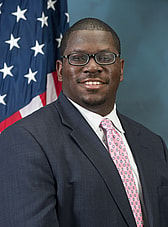While every election cycle features withering analysis about whether Black folks and young people will vote, more attention is needed to ensure that they are actually able to serve in government. Last month, Afro-Cuban Representative-elect Maxwell Alejandro Frost, a Florida community organizer who drove for Uber on his way to becoming the first Gen-Zer elected to Congress, was denied a D.C. apartment due to bad credit. While Frost’s experience is a sadly common occurrence as housing costs continue to soar, it also highlights the systemic barriers that too many Americans face to engage our political system. Addressing these inequities will help promote a more representative and ethical government.
In a lengthy Twitter thread, Frost explained that he accrued significant debt running for Congress and didn’t earn enough from Uber alone to make ends meet. During the primary, Frost quit his day job “to be a full-time candidate. 7 days a week.” He added that because “you can’t give yourself a stipend or anything till the very end of your campaign … you have no $ coming in unless you work a second job.” In closing, Frost quipped, “This ain’t meant for people who don’t already have money.”
Despite demographic trends, Congress is disproportionately whiter and wealthier than the population they represent. People of color comprise 40 percent of the U.S. population, but only 23 percent of the current Congress, 18 percent of top staff in the House of Representatives and 11 percent of top staff in the Senate. More than half of Congress is part of the “1 percent” as millionaires.
One of the primary reasons that Congress doesn’t look like America is that our political system is not designed to accommodate non-wealthy and non-white Americans serving at the highest levels of government. When you have to raise money from the wealthy to get elected, make campaigning your day job and maintain two residences to serve, generational wealth is practically a requirement for becoming a member of Congress. Being rich, having rich friends and cozying to special interests become the norm.
While Congress has long had a diversity problem, which can exacerbate existing discrimination and ethics concerns, there is a real policy impact as well. For example, the public can and should question whether a body overrepresented by the wealthy and underrepresented by people of color can effectively legislate on issues that disproportionately impact the poor and people of color, like student debt, policing, or affordable housing. Watching negotiations related to a congressional stock trading ban, supported by a bipartisan majority of Americans, reach an impasse has led critics and allies to question Congressional leadership’s commitment to its stated values of ethics and equity. These negotiations might have proceeded differently if Congress had more members struggling with debt than managing trust funds.
So what can be done?
Policymakers must act to remove systemic barriers to serving in government. Right now, the Federal Election Commission is soliciting comments on proposed changes to its rules regarding the use of campaign funds to pay the candidate. Under existing rules, if a low-wage worker quits their job to run for office, they can pay themselves no more than what they earned the prior year. It is critical for the FEC to make changes that balance concerns about those who exploit the rules to enrich themselves, as exemplified by the self-dealing of disgraced former congressman Duncan Hunter, with the need to ensure that members of historically disadvantaged communities do not have to mortgage their future to run for government office. Congress should also pass campaign finance reforms, such as those in H.R.1, the For the People Act, which would create a matching system for small donations and help break special interests’ grip on our political system.
Perhaps the most fraught potential reforms to advance ethics, access and diversity on Capitol Hill are to invest in housing and increased salaries for members of Congress. Advocates argue that subsidizing housing for Congress would build collegiality and help avoid ethics concerns from members who sleep in their offices or rent from lobbyists. In addition, despite members’ efforts to fight inflation, Congress has not received a raise in 13 years. As Rep-elect Frost’s experience highlights, although members earn six-figure salaries, maintaining two residences, including in one of America’s most expensive cities, remains challenging for “people who don’t already have money.”
Former members have noted that these financial realities may incentivize members to leave Congress for more lucrative private sector jobs, creating a revolving door that undermines both policy-making and integrity in the institution. Raising member salaries and subsidizing Congressional housing would be an investment to help ensure that serving in Congress ain’t just for folks who have money or rich friends.
Rep-elect Frost’s apartment application denial provided a viral example of the inequities that hinder many from participating, serving or thriving in government. By implementing common-sense reforms, policymakers can contribute to a more inclusive, ethical and accessible government that works for everyone — not just the wealthy and well-connected.

Donald K. Sherman serves as CREW’s Vice President and Chief Counsel. Prior to joining CREW, Sherman served in various roles in the House, Senate, and the Executive Branch, including as Special Assistant to the President for Racial and Economic Justice in the Biden White House and Chief Oversight Counsel to the late Rep. Elijah Cummings, on the House Committee on Oversight and Government Reform. Follow him on Twitter: @donaldonethics.
TheGrio is FREE on your TV via Apple TV, Amazon Fire, Roku, and Android TV. Please download theGrio mobile apps today!


